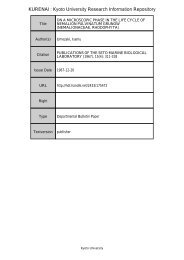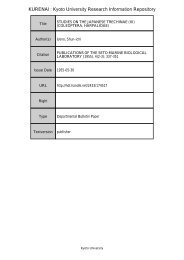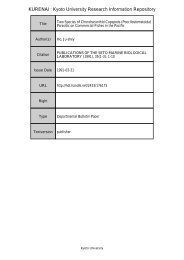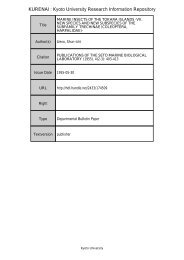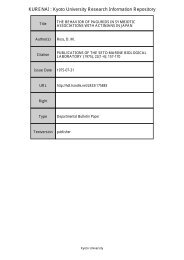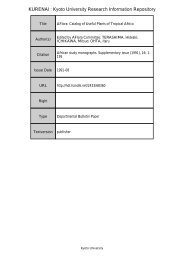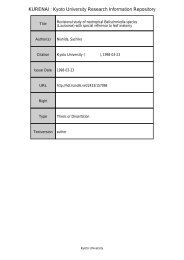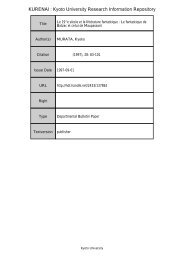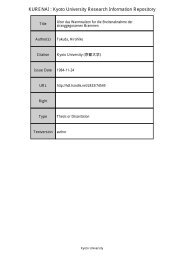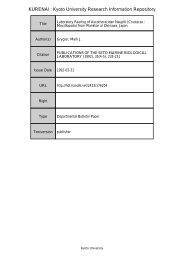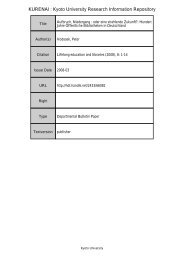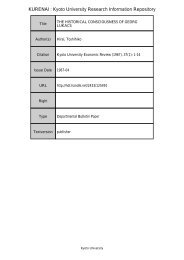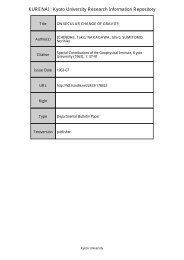Remaindered Life of Citizen-Man, Medium of Democracy
Remaindered Life of Citizen-Man, Medium of Democracy
Remaindered Life of Citizen-Man, Medium of Democracy
You also want an ePaper? Increase the reach of your titles
YUMPU automatically turns print PDFs into web optimized ePapers that Google loves.
N. TADIAR: <strong>Remaindered</strong> <strong>Life</strong> <strong>of</strong> <strong>Citizen</strong>-<strong>Man</strong>, <strong>Medium</strong> <strong>of</strong> <strong>Democracy</strong><br />
embodied in the potential wealth <strong>of</strong> its natural resources: “vast forests which contain some <strong>of</strong><br />
the most valuable trees in the world...rich mines <strong>of</strong> gold, sulphur, coal, and many other minerals.<br />
It has millions <strong>of</strong> hectares <strong>of</strong> land that could be worked and cultivated” [ibid.: 39].<br />
Ins<strong>of</strong>ar as work is the condition for the realization <strong>of</strong> this wealth, it becomes the paramount<br />
obligation <strong>of</strong> citizenship. Work becomes a form <strong>of</strong> service that one renders out <strong>of</strong> a prior debt to<br />
oneʼs government, for the blessings <strong>of</strong> education, infrastructure, public health, and law and<br />
order, and to oneʼs ancestors, whose continuous labor has yielded the wealth <strong>of</strong> cleared and<br />
cultivatable lands, churches and homes, and who have passed on native skills and knowledge.<br />
The value <strong>of</strong> work determines oneʼs value as a citizen. Hence the disparagement <strong>of</strong> “worthless<br />
citizens” as those with no regular occupation: “Some <strong>of</strong> them work only a few days each month.<br />
<strong>Man</strong>y are lazy and shiftless. Some are gamblers and drunkards. All such citizens are<br />
undesirable. They are a source <strong>of</strong> poverty and a danger to our country. Anation <strong>of</strong> loafers and<br />
vicious people cannot become great, nor prosperous” [ibid.: 5].<br />
I have dwelt on these formal ideals <strong>of</strong> citizenship explicitly articulated as the new values <strong>of</strong><br />
imperial democracy because they express what I see as the organizing perceptual principles or<br />
precepts <strong>of</strong> that apparatus called Philippine literature in English, and best exemplified in early<br />
works <strong>of</strong> commonwealth literature. By apparatus, I refer less to Louis Althusserʼs concept <strong>of</strong><br />
Ideological State Apparatuses than to Vilém Flusserʼs concept, which designates the black box<br />
programming the production <strong>of</strong> objects <strong>of</strong> information. Flusserʼs concept refers to the apparatus<br />
<strong>of</strong> photography as a form <strong>of</strong> computational thinking or artificial intelligence encoded in the<br />
hardware or “extended matter” <strong>of</strong> the camera. For Flusser, “the programs <strong>of</strong> apparatuses<br />
consist <strong>of</strong> symbols. Functioning therefore means playing with symbols and combining them”<br />
[Flusser 2000: 38]. While Flusser doesnʼt consider literature as an apparatus, and only resorts to<br />
the anachronistic example <strong>of</strong> writers serving as functionaries <strong>of</strong> the apparatus “language” as<br />
merely an analogical illustration <strong>of</strong> apparatuses proper (which emerge with the production <strong>of</strong><br />
technical images), my own thinking about literature and literary texts within a broader history<br />
<strong>of</strong> media and communicative technologies finds Flusserʼs concept very helpful. As he defines it,<br />
“It is a complex plaything, so complex that those playing with it are not able to get to the bottom<br />
<strong>of</strong> it; its game consists <strong>of</strong> combinations <strong>of</strong> the symbols contained within its program; at the same<br />
time this program was installed by a metaprogram and the game results in further programs;<br />
whereas fully automated apparatuses can do without human intervention, many apparatuses<br />
require the human being as a player and a functionary” [ibid.: 31].<br />
Amediatic understanding <strong>of</strong> literature as apparatus and the writer as player and<br />
functionary is <strong>of</strong> course the antithesis <strong>of</strong> literature as it becomes defined or programmed under<br />
U. S. tutelage as the cultural achievement <strong>of</strong> a people, the very pro<strong>of</strong> and vehicle <strong>of</strong> their<br />
humanity. As the writer Federico <strong>Man</strong>gahas proclaimed in 1940 at a conference celebrating the<br />
achievement <strong>of</strong> Philippine literature under the Commonwealth,<br />
↘<br />
modern liberal law.<br />
467



